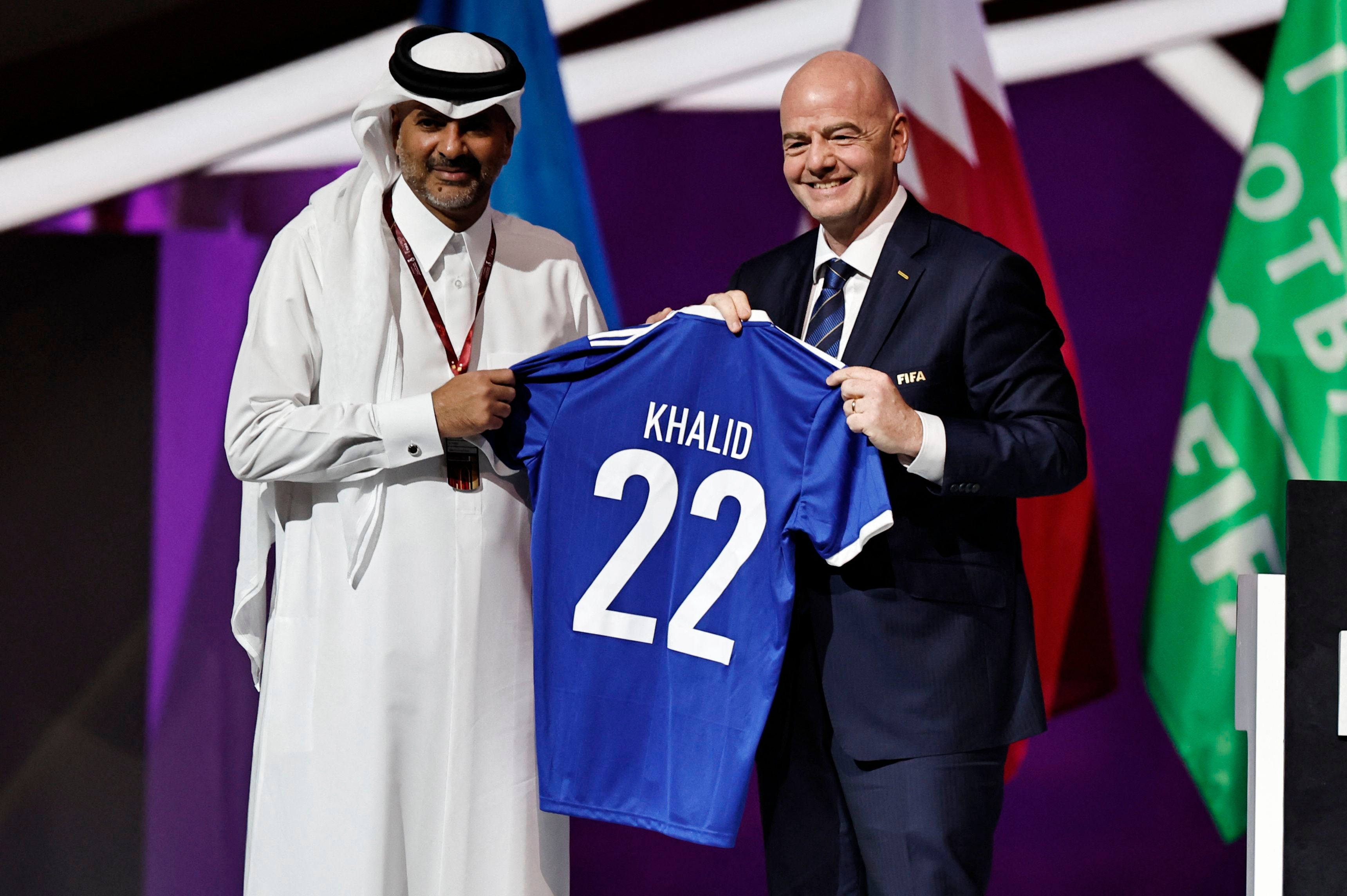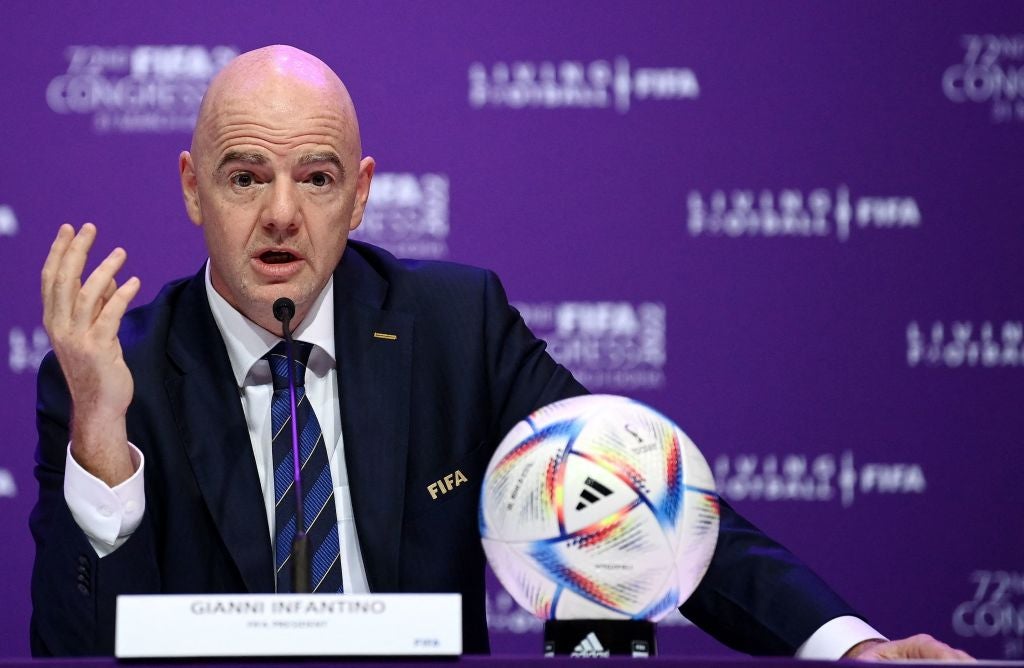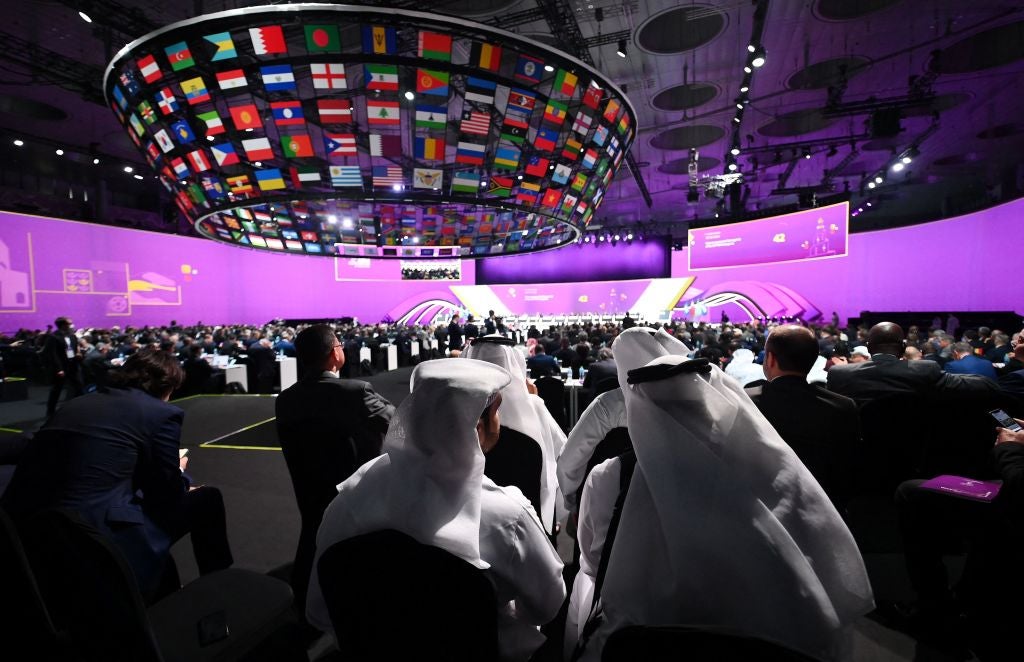Qatar 2022 is here – a tainted World Cup barely worthy of the name
We’re here for Friday’s group stage draw but we’re here because of off-field decisions with far-reaching consequences. So as the draw makes Qatar 2022 ‘real’, is this a real World Cup?

Your support helps us to tell the story
From reproductive rights to climate change to Big Tech, The Independent is on the ground when the story is developing. Whether it's investigating the financials of Elon Musk's pro-Trump PAC or producing our latest documentary, 'The A Word', which shines a light on the American women fighting for reproductive rights, we know how important it is to parse out the facts from the messaging.
At such a critical moment in US history, we need reporters on the ground. Your donation allows us to keep sending journalists to speak to both sides of the story.
The Independent is trusted by Americans across the entire political spectrum. And unlike many other quality news outlets, we choose not to lock Americans out of our reporting and analysis with paywalls. We believe quality journalism should be available to everyone, paid for by those who can afford it.
Your support makes all the difference.It was a moment, in its own way, as electric as anything that has been happening in the World Cup play-offs. That was when Norwegian FA president Lise Klaveness forced everyone at Fifa Congress in Doha to confront the true cost of these games.
“In 2010, World Cups were awarded in unacceptable ways with unacceptable consequences,” she said in an impassioned call for inclusion and human rights. “The migrant workers injured, the families of those that died, must be cared for.”
Many in the room didn’t care for the discussion.
One federation head, clearly looking for his own 15 minutes of approval from the football family, insisted she should not have said that. That, apparently, is not the point. The point is all the World Cup livery, the sense of occasion in Doha.
Shortly afterwards, a package was shown with great moments from previous World Cups, the emotion echoed by that seen in Senegal, Algeria and the United States in the last few days.
That is what the World Cup is supposed to mean. That is what sportswashing projects are actually playing on.
It could be difficult not to get swept along with the emotion of it all. Many of the England set-up felt the same as they looked at the reactions elsewhere after their own friendly win over Ivory Coast. They want some of that. They want the emotions of 2018.
There was a sense of excitement among many arriving at Hamad International Airport, where one of the first things that greets you is of course a huge sign for the World Cup. The tournament surrounds you. This is why the draw is the true first step. The tournament is laid out. You can start to picture how it plays out. It all becomes “real”, to use the words of some of the delegates here.
It is at this point it must be reiterated that the true consequences of this World Cup and Qatar’s sportswashing programme have never been anything but “real” for those who have suffered. That is what Klaveness made a point of referencing.
It is certainly real for Abdullah Ibhais. The former Qatar 2022 media manager is currently serving a three-year prison sentence after what Amnesty International describe as an “unfair trial” following his allegations that the tournament’s organisers – the Supreme Committee for Delivery and Legacy – had covered up their involvement in migrant worker abuses. It is certainly real for the wife of one migrant worker, a 34-year-old Nepalese man who died from unspecified causes in 2020.
“Now everything is shattered,” she told Amnesty International.
This is the real cost of this World Cup. This is what players and federations should be “shining a light on”, to use the phrase of the Football Association and so many players.
Michael Page, deputy Middle East director at Human Rights Watch (HRW), said the draw was “an important marker” for such issues as much as the game. Human Rights Watch have this week released a series of questions that the media should ask of both Fifa and Qatar, as everyone comes together for the draw.
The context for these questions can be read in greater depth on their website, but are worth repeating here. Their starkness only starts to illustrate the scale of this World Cup’s issues. They also demolish the new PR defence that has developed around Qatar in the last few days, that people need to “educate” themselves on the “progress”. There was actually a video shown at Congress to directly confront this and get ahead of the story. Some of those interviewed didn’t feel their views were fully reflected, and it certainly didn’t answer any of HRW’s questions.
HRW’s 10 questions for Fifa and the Qatari authorities
- Why does Fifa continue to praise Qatar’s reform process despite the ongoing human rights violations in Qatar?
- Why are migrant workers in Qatar still not being paid despite announced labour reforms?
- Why has the Qatari government not published official statistics on the total number of migrant deaths disaggregated by nationality, sector and cause, among others?
- Do Fifa and Qatari authorities have any plans to compensate the families of the migrant workers who have died inexplicably in Qatar to make the World Cup possible?
- How do Qatari authorities and Fifa plan to protect migrant workers in Qatar, especially construction workers, whose work might be temporarily affected during the tournament period?
- What will Qatari authorities and Fifa do to monitor and hold people accountable for abuses of service sector workers?
- What is Fifa doing to ensure that migrant workers have the same freedom as all other World Cup visitors during the games, such as watching the games and mingling with visitors?
- What steps has Fifa taken to ensure that Qatar is upholding women’s rights?
- What steps has Fifa taken to protect the rights of LGBT residents in Qatar?
- Will journalists face any restrictions reporting in Qatar if they come for the World Cup?
Such questions, and the moral toll, make it impossible not to wonder whether this should even be considered a “real” World Cup.
Will the winners’ medals always bear a bloodstain?
Even more simply, the basic facts of this draw indicate the disruption Qatar 2022 has necessitated. There is first of all the time and place. Normally being staged a month before Christmas, the draw must this year take place in April, in 30-degree desert heat. There is then the draw itself. For the first time ever, it won’t feature all the teams who will compete. There will be three blank spaces. One of those is admittedly due to the unforeseen circumstances of Russia’s invasion of Ukraine, but the other two – from intercontinental play-offs in June – are just another sign of how much has had to be accommodated for a World Cup that never should have been allowed in the first place.
The very reality it is happening in a country as small and as questioned as Qatar, in winter, remains astounding. The passage of time renders it no more normal. Fifa president Gianni Infantino did attempt to normalise its strangeness by pointing to how eight stadiums within 50km means fans and teams won’t have to move, but that only serves to remind everyone how ill-suited it is. It already remains to be seen whether there will be sufficient accommodation in what is effectively a city-state.

This, for reasons as simple as logistics to those as complicated as human rights, just shouldn’t be taking place.
There is a poignancy to that underlying the most pointed questions, though. In more acceptable circumstances, this could be a World Cup with genuine merit.
A collection of human rights groups staged a briefing with journalists a few months ago to stress that this tournament could still be used as an opportunity, and reminded the audience that it was the first World Cup to ever be held in a Muslim country. That would normally be a beautiful thing, that Gareth Southgate made a point of stressing.
“It’s the first World Cup in a Muslim country, the first in the Middle East and it’s the first World Cup in the middle of the season so it’s a hugely different feel. Culturally, it’s a different feel.”
Infantino did reference this in an odd press conference, but attempted to put up the straw man argument that critics had said the tournament should not go to “Arab countries” or those without football culture.
It should not need to be stated that this is not why people are objecting to Qatar. They are objecting to a sportswashing exercise.
Along the same lines, Infantino was asked about the changed legacy of Russia 2018. He had earlier referenced the invasion of Ukraine without directly naming Vladimir Putin – who awarded the Fifa president with an “Order of Friendship” medal – and here went on a long-winded but evasive answer about football’s “power”.
Russia 2018 should offer a lesson here.
The 2018 World Cup was preceded by so many discussions of its problematic nature, only for everyone who went to enthuse about what a wonderful cultural experience they had. Many of those experiences remain true, since the people and country will always be separate from the state. It’s just also true that it’s impossible to detach that tournament from the state’s political aims. They have become more transparent in the last month, amid Putin’s ambitions for “Russian greatness”. They have also changed the perspective of those cultural experiences and that World Cup.
Russia 2018 now looks very different, like a modern Berlin Olympics, and its legacy is set to be the subject of much greater discussion over the next few months.
It reminds us the tail doesn’t wag the dog here. Problematic regimes use sport much more than sport changes problematic regimes.
It also reminds that, for all the questions over whether the medals in Qatar will be stained, this is far from the first or second morally compromised World Cup. It’s just the latest in a considerable list.
There was certainly Italy 1934 and Argentina 1978, at the very least. South Africa 2010 and Brazil 2014 meanwhile posed serious questions over the use of public funds in grossly unequal states. Many would willingly include USA-Canada-Mexico 2026 given the foreign policies of the Oval Office.
It’s just that, up until Russia, this had looked the most problematic World Cup of all. There was the very construction of it, as illustrated by so many questions about migrant workers. There were the sportswashing motivations for it. And, before anything, there was the controversial winning of it.
The fallout from that sensational 2010 vote is one other reason why Qatar 2022 will always be intertwined with Russia 2018, but it is possible they will be bound together in another way. It is at least arguable they will be the last tournaments of the sportswashing era, one very much anchored to the turn of the millennium.
Klaveness herself touched on this by referencing how bids were won “in 2010”. Infantino spoke about the changed process. Only adding to this, one consequence of Putin’s invasion is that it has alerted many more people to the true reality of the era, as Russia’s very absence from this draw illustrates.
Federations now face far greater pressure than ever to consider human rights concerns. There may already be some effect. China had once been seen as the inevitable selection for 2030, but that now seems unlikely.
The current Fifa regime meanwhile insist they “inherited” Russia and Qatar from their predecessors, so must look to the future. Figures within the federation also point to what they see as a “carve-up” from European countries for tournaments to come. It now looks likely that Euro 2028 will be the United Kingdom and Ireland, 2030 will be Spain-Portugal with some fixtures in Uruguay to recognise the centenary, and then 2032 in Italy.
It is a series that does certainly have a more traditionalist feel, right down to the fact that opening game in 2030 could well take place in Montevideo, 100 years after the very first World Cup match was played in the Uruguayan capital. It would certainly suit both Uefa and Conmebol.
When Infantino referenced the continued existence of “tactical voting” despite the bidding reforms, many in the room took that as a reference to this.
Uefa sources meanwhile counter that Infantino does have a good working relationship with criticised Middle Eastern states. Abu Dhabi just hosted another Club World Cup. There remains suspicion that Saudi Arabia will win a World Cup in the near future, particularly given the political pressure from their own regional rivalry with Qatar.
Both of their national teams will be among the 29 names in Friday’s draw, with Qatar set to be sole debutant. It still shouldn’t be overlooked that the pure sporting ambitions of the players remain at a remove from the political ambitions of their state.
That is one other reason why human rights groups have not pushed for outright boycotts of this World Cup. There is still a core sporting spirit to any event, no matter its context. It’s all the more pronounced at a World Cup, given it is only held every four years. That gives it an emotional power beyond political power, which is precisely why it is used.
Some of the figures involved, particularly with infrequent qualifiers like Ecuador, may have the misfortune of reaching their only ever World Cup when it happens to be somewhere as problematic as Qatar.

It is consequently an unfair burden to put on players, even if they should be aware of the wider cost. Players can still influence change and use their leverage.
And yet, even if they do try to just “concentrate on the football”, the strangeness of this tournament will interfere.
It will influence wishes around the draw. Bigger nations would benefit from being picked in the later groups, for example, because it will allow a precious few extra days to prepare. The tournament starts just eight days after domestic leagues break.
There’s then that wider switch in the cycle.
International teams are not usually primed to peak in the middle of a season. It all comes at a funny stage for the level.
It feels right now like most of the biggest teams are between eras, not quite at their best. England are arguably one of the most stable and rising to a peak, with that fitting with how the FA specifically targeted 2022 as a long-term ambition. France, Belgium and Portugal are possibly past their best. Germany and Spain are maybe too far back. European champions Italy are not there at all, having again been the biggest name to fail to qualify.
Many of the other heavyweights, like Brazil and Argentina, are actually unknowns. They’ve barely played European sides in the last four years.
Some of this comes amid a wider economic shift in the game, with the wealthy western European countries benefiting from the industrialisation of the sport in the way their clubs have done.
Germany still remain the team to avoid in Pot 2, though. The hosts, Qatar, remain the team to aim for in Pot 1. An irony to that is they are better ranked than two of the last three hosts.
“We are one of the teams – I think there are a few – that could win this tournament,” Southgate said. “That’s putting aside the fact any number of teams can beat an opponent. That’s the jeopardy of a World Cup.”
It’s sport. An awful lot can change. Another irony of these draws is that they just never go the way you picture when they are laid out.
Infantino had attempted to point to all this as he closed out Congress.
“We are now talking about what we should be talking about the whole time – football. The greatest show on earth.”
It’s just that this may well be the worst possible version of it.
Join our commenting forum
Join thought-provoking conversations, follow other Independent readers and see their replies
Comments